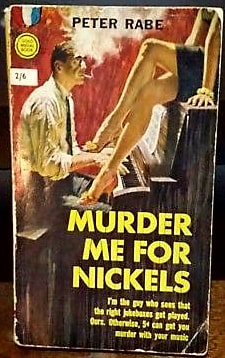Well, let's talk a little about this book.
Right from the start, there was something else different about this novel, though. For one, the prose is a little more literary than I expect from a GM book, which gave it a slightly odd feeling.
More than odd, though, the book is downright uneven.
The tone of the novel begins in a hard-boiled literary form, then switches to a humorous tone it keeps up for a while before switching to a more standard hard-boiled crime feel (albeit briefly).
The plot starts out focused, particularly on the problem of the jukebox war, but also on a love triangle but, then meanders into the workings of the record-distribution industry circa 1960 and spends far, far too much time there. Then, in literally the last four or five thousand words or so, the novel remembers it's supposed to be a crime novel and tosses in a pointless kidnapping which results in a murder. Finally, on the very last page, the protagonist finds out that in the six or so hours during which he was kidnapped, all the plot-points have been wrapped up off-camera without his involvement.
As I said, I read this because an essay Westlake wrote on Rabe intrigued me and this was the first Rabe I stumbled across after reading it. Westlake's essay basically says Rabe was a genius storyteller constitutionally unsuited to the publishing industry. He described Rabe's career as writing books that were "pate, but were treated like liverwurst by his agent, the industry and readers alike" and that after five or six years, Rabe started to believe liverwurst was what everyone wanted, so he began to write "some very bad books, often in ten days or less" interspersed with a few books that were weak but had some good parts, before moving away from original fiction into novelizations and media tie-in novels, then leaving writing entirely. Rabe's first novel was published in 1955. MURDER ME FOR NICKELS was published in 1960, which put it right at the tail-end of his so-called "pate phase."
This isn't isn't pate, but it's only a step above liverwurst, to continue the metaphor. It's very much a mixed bag. There are a number of clever turns of phrase in the prose and a few legitimately amusing, even funny, verbal exchanges, but the plot is stupid, meandering and pointless and the characters so paper-thin I honestly had a hard time remembering who was who in several instances, especially in crowd scenes.
I'm still curious to read some good Rabe and if I run across something in the future, I'll check the copyright date to see what era it fits into before making a buying decision. Will I seek more Rabe out, though? I really doubt it.


 RSS Feed
RSS Feed